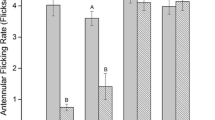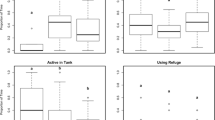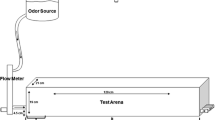Abstract
Crayfish rely on their chemosensory system for many essential behaviours including finding food, finding mates, and to recognize individuals. Copper can impair chemosensation in crayfish at low concentrations; however, it is not clear if the effect is ameliorated once copper is removed. To better understand the effect of and recovery from copper exposure in crayfish, we exposed Northern clearwater crayfish (Faxonius propinquus) to 31.3 \({\upmu }\text{g}/\text{L}\) copper for 24 h and measured the response of the crayfish to a food cue. The crayfish were then placed into clean water to depurate for an 24 h. The results demonstrated that the crayfish did not respond to a food cue if they had been exposed to copper, but showed a full response after a 24 h recovery period without copper. Higher concentrations of copper have shown a much longer-term effect in rusty crayfish (Faxonius rustics), indicating there is a concentration where the copper is causing longer-term damage instead of just impairing chemosensation. These results highlight the fact that even though contaminants like copper can have profound effects at low concentrations, by removing the contaminants the effect can be ameliorated.


Similar content being viewed by others
References
Azizishirazi A, Pyle GG (2015) Recovery of olfactory mediated behaviours of fish from metal contaminated lakes. Bull Environ Contam Toxicol 95:1–5
Azizishirazi A, Dew WA, Forsyth HL, Pyle GG (2013) Olfactory recovery of wild yellow perch from metal contaminated lakes. Ecotoxicol Environ Saf 88:42–47. https://doi.org/10.1016/j.ecoenv.2012.10.015
Baldwin DH, Sandahl JF, Labenia JS, Scholz NL (2003) Sublethal effects of copper on coho salmon: impacts on nonoverlapping receptor pathways in the peripheral olfactory nervous system. Environ Toxicol Chem 22:2266–2274. https://doi.org/10.1897/02-428
Bergman DA, Moore PA (2003) Field observations of intraspecific agonistic behavior of two crayfish species, Orconectes rusticus and Orconectes virilis, in different habitats. Biol Bull 205:26–35. https://doi.org/10.2307/1543442
Bergman DA, Kozlowski CP, McIntyre JC et al (2003) Temporal dynamics and communication of winner-effects in the crayfish, Orconectes rusticus. Behaviour 140:805–825. https://doi.org/10.1163/156853903322370689
Dew W, Wood C, Pyle G (2012) Effects of continuous copper exposure and calcium on the olfactory response of fathead minnows. Environ Sci Technol 46:9019–9026. https://doi.org/10.1021/es300670p
Dew WA, Azizishirazi A, Pyle GG (2014) Contaminant-specific targeting of olfactory sensory neuron classes: connecting neuron class impairment with behavioural deficits. Chemosphere 112:519–525. https://doi.org/10.1016/j.chemosphere.2014.02.047
Green WW, Mirza RS, Wood C, Pyle GG (2010) Copper binding dynamics and olfactory impairment in fathead minnows (Pimephales promelas). Environ Sci Technol 44:1431–1437. https://doi.org/10.1021/es9023892
Grosell M (2012) Copper. In: Wood CM, Farrell AP, Brauner CJ (eds) Homeostasis and toxicology of essential metals, 31 Part A. pp 53–133
Kassambara A (2020) ggplot2. Based publication ready plots
Kolmakov NN, Hubbard PC, Lopes O, Canario AVM (2009) Effect of acute copper sulfate exposure on olfactory responses to amino acids and pheromones in goldfish (Carassius auratus). Environ Sci Technol 43:8393–8399. https://doi.org/10.1021/es901166m
Lahman SE, Moore PA (2015) Olfactory sampling recovery following sublethal copper exposure in the rusty crayfish, Orconectes rusticus. Bull Environ Contam Toxicol 95:441–446. https://doi.org/10.1007/s00128-015-1623-4
Lahman SE, Trent KR, Moore PA (2015) Sublethal copper toxicity impairs chemical orientation in the crayfish, Orconectes rusticus. Ecotoxicol Environ Saf 113:369–377. https://doi.org/10.1016/j.ecoenv.2014.12.022
Lari E, Abtahi B, Hashtroudi MS et al (2015) The effect of sublethal concentrations of the water-soluble fraction of crude oil on the chemosensory function of Caspian roach, Rutilus caspicus (YAKOVLEV, 1870). Environ Toxicol Chem 34:1826–1832. https://doi.org/10.1002/etc.2994
Lodge DM, Kershner MW, Aloi JE, Covich AP (1994) Effects of an omnivorous crayfish (Orconectes rusticus) on a freshwater littoral food web. Ecology 75:1265–1281. https://doi.org/10.2307/1937452
Momot WT (1984) Crayfish production: a reflection of community energetics. J Crustac Biol 4:35–54. https://doi.org/10.2307/1547894
Pyle GG, Mirza RS (2007) Copper-impaired chemosensory function and behavior in aquatic animals. Hum Ecol Risk Assess 13:492–505. https://doi.org/10.1080/10807030701340995
R Core Development Team (2021) R: a language and environment for statistical computing. R Foundation for Statistical Computing
Reynolds J, Souty-Grosset C, Richardson A (2013) Ecological roles of crayfish in freshwater and terrestrial habitats. Freshw Crayfish 19:197–218. https://doi.org/10.5869/fc.2013.v19-2.197
Scholl LE, Sultana T, Metcalfe C, Dew WA (2022) Clothianidin interferes with recognition of a previous encounter in rusty crayfish (Faxonius rusticus) due to a chemosensory impairment. Chemosphere 296:133960. https://doi.org/10.1016/j.chemosphere.2022.133960
Tierney KB, Baldwin DH, Hara TJ et al (2010) Olfactory toxicity in fishes. Aquat Toxicol 96:2–26. https://doi.org/10.1016/j.aquatox.2009.09.019
Usio N, Townsend CR (2002) Functional significance of crayfish in stream food webs: roles of omnivory, substrate heterogeneity and sex. Oikos 98:512–522. https://doi.org/10.1034/j.1600-0706.2002.980316.x
Woodman SG, Steinkey D, Dew WA et al (2016) Effects of sertraline on behavioral indices of crayfish Orconectes virilis. Ecotoxicol Environ Saf 134:31–37. https://doi.org/10.1016/j.ecoenv.2016.08.011
Acknowledgements
The authors wish to thank Pardeep Maan for helping run the trials as well as Paola Abreu for helping with collection of study animals.
Author information
Authors and Affiliations
Corresponding author
Ethics declarations
Conflict of interest
The authors have no relevant financial or non-financial interests to disclose.
Additional information
Publisher’s Note
Springer Nature remains neutral with regard to jurisdictional claims in published maps and institutional affiliations.
Rights and permissions
Springer Nature or its licensor (e.g. a society or other partner) holds exclusive rights to this article under a publishing agreement with the author(s) or other rightsholder(s); author self-archiving of the accepted manuscript version of this article is solely governed by the terms of such publishing agreement and applicable law.
About this article
Cite this article
Arndt, A., Emilson, E.J. & Dew, W.A. Copper-Induced Chemosensory Impairment is Reversed by a Short Depuration Period in Northern Clearwater Crayfish (Faxonius propinquus). Bull Environ Contam Toxicol 112, 45 (2024). https://doi.org/10.1007/s00128-024-03863-4
Received:
Accepted:
Published:
DOI: https://doi.org/10.1007/s00128-024-03863-4




